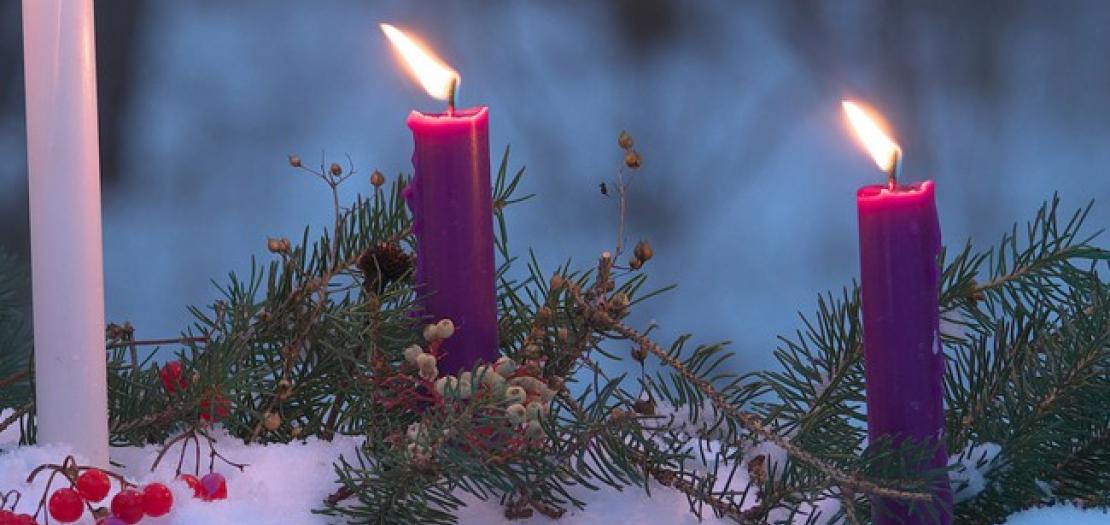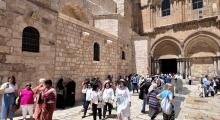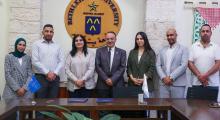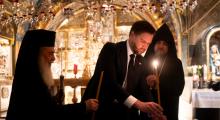Issued by the Catholic Center for Studies and Media - Jordan. Editor-in-chief Fr. Rif'at Bader - موقع أبونا abouna.org

In difficult times, when we wait and hope for help that will somehow come, there is always someone who first sees the way to salvation.
Someone who has honed the gaze of the heart, who has drawn on words that come from afar and for that reason, is the only one capable of illuminating a new stretch of road.
Following is the text of the meditation by His Beatitude Cardinal Pierbattista Pizzaballa, Latin Patriarch of Jerusalem, marking the second Sunday of Advent, year B, December 10, 2023:
This one has a specific and fundamental task, namely to warn everyone of what is happening, so that even those who do not yet see, may realize, may open their eyes, may awaken from their torpor. May they awaken the expectation they carry within them.
His task is decisive, like that of the gatekeeper mentioned in last Sunday's Gospel (Mark 13:34): he sees the master's return first, and warns everyone in the house.
Salvation history is studded with these figures, these prophets who announce the return of God who renews the covenant with his people. Often they do not have an easy life, because opening to the newness requires a deep awareness of what dwells in us, which may not be understood by others. This is why many of them have been rejected, excluded; some even killed.
In today's Gospel (Mark 1:1-8) this "gatekeeper" is John. We are at the very beginning of Mark's Gospel, and it is a beginning that recalls the first beginning of salvation history. The first word, in fact, is precisely "beginning". (Mark 1:1)
Indeed, true newness always begins with a return to what was in the beginning, to what lies at the foundation: this is what the prophets are called to indicate.
What is this foundation, on which the whole house is then built?
The foundation is the Word that God has spoken through the ages and is now being fulfilled.
Not just any word, but the combination of three biblical passages evoked and composed together, to tell the whole newness that is happening: the Book of Exodus, (Exodus 23:20) where the angel sent by God is presented to his people to accompany and guide them on their way to the promised land; the evocation of a verse from the prophet Malachi (Ml 3:1), which reminds us that the people are on their way not only to the promised land, but also to the great and terrible day of final judgment. And at last, the prophet Isaiah, (Isa 40:3) who announces the liberation from slavery and the beginning of a new exodus, which will bring the people back to the promised land.
All of this, then, defines John's mission, which is to open the door to a newness, to a definitive turning point in God's history with his people: the proclamation of freedom that has resounded through the centuries is about to be fulfilled, and the opportunity, that "kairos" we spoke of last Sunday, must not be missed.
John must "just" listen to the Word and make it resonate, make himself a spokesman for the proclamation he has received.
Where does he do this?
Although he is from a priestly family, John does not go to preach in the temple, but goes into the desert (Mark. 1:3): not rituals, not sacrifices will give salvation, but the nakedness of a listening and repenting heart, the trust of a heart that awaits everything from God.
And if last Sunday the key word was "home," today the word that most returns is that which indicates the path, the way, the journey: in just a few verses (Mark 1:2-3) it returns three times.
To say that the Baptist's invitation is to set out again, just as the inhabitants of Judea and Jerusalem do (Mark 1:5), who flock to the Jordan. It is a physical journey, theirs, but also an inner journey, that of those who descend into the depths of their hearts and discover the need and possibility of repentance.
And perhaps, this very repentance is the way to "make straight" (Mark 1:3) the ways of the Lord.
When the emperor, or an important personage, arrived in a city, the roads were prepared and, if necessary, new ones created: straight roads, not winding ones, so that the arrival of the king would be more speedy and more solemn.
This is the Baptist's invitation, which even today seems to say to us: not a king, but the Lord Himself is coming.
He is coming not like the other mighty ones, who come to demand and to take: He, on the contrary, will give us His own Spirit.
So prepare the ways for Him, knowing that to do so does not require us to do great things, but simply to find the principle, the foundation, that is, the dialogue with the Lord, who comes to reveal to us His way of mercy, to open to us the path of conversion to Him.
+Pierbattista







